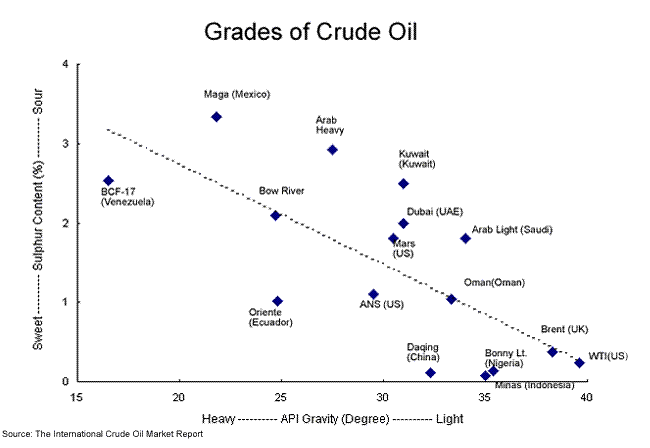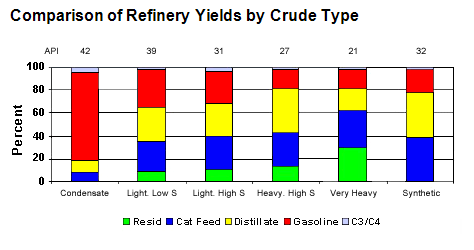 by ROCKMAN » Sat 04 Oct 2014, 02:56:30
by ROCKMAN » Sat 04 Oct 2014, 02:56:30
Some added chatter to the subject:
The Department of Commerce commodity classification decision allowing the export of condensates in one specific instance earlier this year fanned the flames of the crude oil export debate. A previous Petro Primer post discusses why this decision was erroneously misinterpreted as a move to open the doors to unfettered exports of crude oil. However, the ensuing attention to the decision has generated debate about two critical policy questions: What exactly is a condensate? And what does defining a condensate mean for the crude export debate? The answers are not apparent and provide another example of the need for a comprehensive approach to energy policy.
Oddly enough, there is not even a common industry definition of condensate. The head of the U.S. Energy Information Administration recently stated, “What condensate is, is up in the air.” It is generally considered a very light type of crude oil with API gravity somewhere north of 45 degrees, but this is not the only metric that could be used in formulating a more exact definition. For example, a condensate designation could be based on the chemical composition of a hydrocarbon mixture. Various states also have several different condensate definitions (such as CO, LA, MT, ND, OK, SD, TX, and WY). Additionally, as discussed in the previously referenced post, there is plant condensate, which is one of several products generated in a natural gas processing plant, and lease condensate, which is condensate produced at the wellhead of an upstream crude oil or natural gas operation. Plant condensate can be exported without restriction, while the crude oil export restrictions apply to lease condensate.
The diversity of options for defining condensate creates several challenges for expanding crude oil exports. The Department of Commerce (Title 15 CFR 754.2) defines crude oil in the following manner:
"Crude oil" is defined as a mixture of hydrocarbons that existed in liquid phase in underground reservoirs and remains liquid at atmospheric pressure after passing through surface separating facilities and which has not been processed through a crude oil distillation tower. Included are reconstituted crude petroleum, and lease condensate and liquid hydrocarbons produced from tar sands, gilsonite, and oil shale. Drip gases are also included, but topped crude oil, residual oil, and other finished and unfinished oils are excluded.
The Department of Commerce Bureau of Industry Security (BIS) commodity classification decisions earlier this year seemed to indicate that lease condensate could be exported if 1) it was the result of crude oil passing through a distillation tower and 2) the products left after crude is moved through such a tower are significantly different than the crude oil input. Seem fairly straightforward? Not so much. There are various forms of distillation with varying degrees of complexity. This raises the question of how much processing is required for something to be considered eligible for export.
To date, this decision has been made on a case by case basis through the BIS process. However, a group of refiners concerned with the Administration’s condensate classification recently challenged such decisions in a letter to Department of Commerce officials. The group argues precedent and the language of the regulation clearly distinguishes between “surface separation facilities,” which it believes was the process through which the condensate approved for export underwent, and more complex crude distillation. Such concerns, along with the myriad of possible definitions, are likely the reasons why the federal government has begun working with stakeholders to try and find an agreed upon designation.
In complex legal matters such as these, when there are many definitions, that usually means there are effectively no definitions. Such lack of certainty could mean lengthy litigation surrounding any administrative attempt to expand crude oil exports. These considerations emphasize why the crude export debate is best left in Congress’ hands. For better or for worse, Congress is the only body that can provide true certainty through clear changes to the statutory language, rather than administrative changes to the existing regulation open to potentially time consuming court battles. In addition to addressing key policy questions surrounding crude oil exports, the legislative process will allow Congress to explore energy policy holistically and examine what other regulatory barriers may also need to be addressed to ensure America can take full advantage of the domestic oil and natural gas boom, while also positioning itself as a pillar of global energy security.
{And as I've pointed out before Texas makes the distinction between condensate and crude oil based upon certain reservoir metrics at the time of production... not the gravity of that liquid hydrocarbon. In fact production from a specific well might be classified as condensate but the identical oil could be reclassified several years later as crude oil when those reservoir metrics change. So when the Texas stats say X million bbl's of "condensate" has been produced what exactly h's been produced?}







